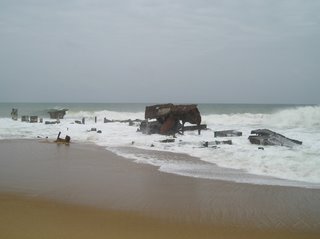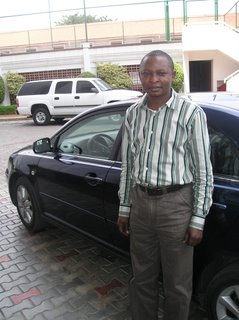 pretty workable plan for vehicles. They have a fleet of cars and hire the drivers. Each expatriate will have a driver that is assigned to them, but on their days off, they will provide you with someone else to drive you around. Each family will have the use of one car and driver at no cost to the expatriate. If we were to need a second vehicle (which I don't think we will), the company would deduct an "auto cost factor" from our paycheck. They basically figure an average cost for a vehicle and gas and take that from you. But it's a pretty nice perk, I think to have a car and driver and gas at no cost. They provide that because, frankly, at times it is an inconvenience to have to plan ahead to have the driver there when you need him and not always have the car instantly at your disposal. And when you need your driver at night, you realize that you're keeping him from going home to his family, so that kind of made me feel bad for him. Dennis looks like a really young guy, but actually he has a 19 year old son -- he said he became a father when he was just a teenager and his parents pretty much raised his son. He's now married with, I think, 3 young children. He came to Lagos many years ago and wanted to go to college to be an engineer, but he didn't have enough money, so he got a job as a driver. He still tries to take some classes in his spare time in hopes to get a better job. But he says that driving is a pretty good job. The drivers have security training and they are our protection, though driving around the islands, they are not generally armed. They all have cell phones, as well as a radio in the car and every 15 minutes or so, they call in their position to the radio room. The radio room monitors any areas of disturbance in the city and will let the drivers know of areas to avoid. Several years ago on Victoria Island (which is considered a safer part of Lagos) there was a carjacking of a ConocoPhillips car -- the expatriate was released unharmed, but the driver was killed. In a dinner discussion, an expatriate said that was often the case with crime here, the expatriate's money or possessions will be taken, but they will usually be unharmed. Nigerian lives don't get the same respect. That's maybe a bit reassuring for me -- but I certainly hope that I am never in a position where someone else becomes a victim in an attempt to protect me.
pretty workable plan for vehicles. They have a fleet of cars and hire the drivers. Each expatriate will have a driver that is assigned to them, but on their days off, they will provide you with someone else to drive you around. Each family will have the use of one car and driver at no cost to the expatriate. If we were to need a second vehicle (which I don't think we will), the company would deduct an "auto cost factor" from our paycheck. They basically figure an average cost for a vehicle and gas and take that from you. But it's a pretty nice perk, I think to have a car and driver and gas at no cost. They provide that because, frankly, at times it is an inconvenience to have to plan ahead to have the driver there when you need him and not always have the car instantly at your disposal. And when you need your driver at night, you realize that you're keeping him from going home to his family, so that kind of made me feel bad for him. Dennis looks like a really young guy, but actually he has a 19 year old son -- he said he became a father when he was just a teenager and his parents pretty much raised his son. He's now married with, I think, 3 young children. He came to Lagos many years ago and wanted to go to college to be an engineer, but he didn't have enough money, so he got a job as a driver. He still tries to take some classes in his spare time in hopes to get a better job. But he says that driving is a pretty good job. The drivers have security training and they are our protection, though driving around the islands, they are not generally armed. They all have cell phones, as well as a radio in the car and every 15 minutes or so, they call in their position to the radio room. The radio room monitors any areas of disturbance in the city and will let the drivers know of areas to avoid. Several years ago on Victoria Island (which is considered a safer part of Lagos) there was a carjacking of a ConocoPhillips car -- the expatriate was released unharmed, but the driver was killed. In a dinner discussion, an expatriate said that was often the case with crime here, the expatriate's money or possessions will be taken, but they will usually be unharmed. Nigerian lives don't get the same respect. That's maybe a bit reassuring for me -- but I certainly hope that I am never in a position where someone else becomes a victim in an attempt to protect me.
I'm a empty-nester mom of 3 and wife to an oil-company executive who is working on a project in Lagos, Nigeria. All many people hear about Lagos is bad stuff -- I'm here looking for the good in Lagos.
Friday, September 22, 2006
The 20th good thing about Lagos: Having a driver!
I've never before lived in a place where I had a driver and I must say, it's something I could get used to! In Lagos, it is absolutely essential -- I would never dare to negotiate the wild and crazy traffic scene and trying would be very stressful. It's quite relaxing to be driven around. I generally spent my car time looking around me wide-eyed at the foreign-ness of everything. But maybe eventually I would get to the point where I might do some reading or napping on the road. This is a photo of Dennis, who was our driver for most of my time in Lagos. During the week he generally wore a white shirt and slacks, except on Friday, which is Nigerian dress day at the office. I took this picture on our last day there, Sunday, and he was more casually dressed than usual. He generally drove for an employee who was then on vacation. I don't think he was thrilled with the reality of driving a "wife," because he had to work during the day and drive me here and there instead of having the day free to visit with his fellow drivers. But he did a fine job of plunging his car ahead into the roundabouts and taking the right-of-way even when others were attempting to do the same. We had some very close scrapes, but never actual contact with other vehicles. I felt like he really took pride in the car. ConocoPhillips has what I felt like was a  pretty workable plan for vehicles. They have a fleet of cars and hire the drivers. Each expatriate will have a driver that is assigned to them, but on their days off, they will provide you with someone else to drive you around. Each family will have the use of one car and driver at no cost to the expatriate. If we were to need a second vehicle (which I don't think we will), the company would deduct an "auto cost factor" from our paycheck. They basically figure an average cost for a vehicle and gas and take that from you. But it's a pretty nice perk, I think to have a car and driver and gas at no cost. They provide that because, frankly, at times it is an inconvenience to have to plan ahead to have the driver there when you need him and not always have the car instantly at your disposal. And when you need your driver at night, you realize that you're keeping him from going home to his family, so that kind of made me feel bad for him. Dennis looks like a really young guy, but actually he has a 19 year old son -- he said he became a father when he was just a teenager and his parents pretty much raised his son. He's now married with, I think, 3 young children. He came to Lagos many years ago and wanted to go to college to be an engineer, but he didn't have enough money, so he got a job as a driver. He still tries to take some classes in his spare time in hopes to get a better job. But he says that driving is a pretty good job. The drivers have security training and they are our protection, though driving around the islands, they are not generally armed. They all have cell phones, as well as a radio in the car and every 15 minutes or so, they call in their position to the radio room. The radio room monitors any areas of disturbance in the city and will let the drivers know of areas to avoid. Several years ago on Victoria Island (which is considered a safer part of Lagos) there was a carjacking of a ConocoPhillips car -- the expatriate was released unharmed, but the driver was killed. In a dinner discussion, an expatriate said that was often the case with crime here, the expatriate's money or possessions will be taken, but they will usually be unharmed. Nigerian lives don't get the same respect. That's maybe a bit reassuring for me -- but I certainly hope that I am never in a position where someone else becomes a victim in an attempt to protect me.
pretty workable plan for vehicles. They have a fleet of cars and hire the drivers. Each expatriate will have a driver that is assigned to them, but on their days off, they will provide you with someone else to drive you around. Each family will have the use of one car and driver at no cost to the expatriate. If we were to need a second vehicle (which I don't think we will), the company would deduct an "auto cost factor" from our paycheck. They basically figure an average cost for a vehicle and gas and take that from you. But it's a pretty nice perk, I think to have a car and driver and gas at no cost. They provide that because, frankly, at times it is an inconvenience to have to plan ahead to have the driver there when you need him and not always have the car instantly at your disposal. And when you need your driver at night, you realize that you're keeping him from going home to his family, so that kind of made me feel bad for him. Dennis looks like a really young guy, but actually he has a 19 year old son -- he said he became a father when he was just a teenager and his parents pretty much raised his son. He's now married with, I think, 3 young children. He came to Lagos many years ago and wanted to go to college to be an engineer, but he didn't have enough money, so he got a job as a driver. He still tries to take some classes in his spare time in hopes to get a better job. But he says that driving is a pretty good job. The drivers have security training and they are our protection, though driving around the islands, they are not generally armed. They all have cell phones, as well as a radio in the car and every 15 minutes or so, they call in their position to the radio room. The radio room monitors any areas of disturbance in the city and will let the drivers know of areas to avoid. Several years ago on Victoria Island (which is considered a safer part of Lagos) there was a carjacking of a ConocoPhillips car -- the expatriate was released unharmed, but the driver was killed. In a dinner discussion, an expatriate said that was often the case with crime here, the expatriate's money or possessions will be taken, but they will usually be unharmed. Nigerian lives don't get the same respect. That's maybe a bit reassuring for me -- but I certainly hope that I am never in a position where someone else becomes a victim in an attempt to protect me.
 pretty workable plan for vehicles. They have a fleet of cars and hire the drivers. Each expatriate will have a driver that is assigned to them, but on their days off, they will provide you with someone else to drive you around. Each family will have the use of one car and driver at no cost to the expatriate. If we were to need a second vehicle (which I don't think we will), the company would deduct an "auto cost factor" from our paycheck. They basically figure an average cost for a vehicle and gas and take that from you. But it's a pretty nice perk, I think to have a car and driver and gas at no cost. They provide that because, frankly, at times it is an inconvenience to have to plan ahead to have the driver there when you need him and not always have the car instantly at your disposal. And when you need your driver at night, you realize that you're keeping him from going home to his family, so that kind of made me feel bad for him. Dennis looks like a really young guy, but actually he has a 19 year old son -- he said he became a father when he was just a teenager and his parents pretty much raised his son. He's now married with, I think, 3 young children. He came to Lagos many years ago and wanted to go to college to be an engineer, but he didn't have enough money, so he got a job as a driver. He still tries to take some classes in his spare time in hopes to get a better job. But he says that driving is a pretty good job. The drivers have security training and they are our protection, though driving around the islands, they are not generally armed. They all have cell phones, as well as a radio in the car and every 15 minutes or so, they call in their position to the radio room. The radio room monitors any areas of disturbance in the city and will let the drivers know of areas to avoid. Several years ago on Victoria Island (which is considered a safer part of Lagos) there was a carjacking of a ConocoPhillips car -- the expatriate was released unharmed, but the driver was killed. In a dinner discussion, an expatriate said that was often the case with crime here, the expatriate's money or possessions will be taken, but they will usually be unharmed. Nigerian lives don't get the same respect. That's maybe a bit reassuring for me -- but I certainly hope that I am never in a position where someone else becomes a victim in an attempt to protect me.
pretty workable plan for vehicles. They have a fleet of cars and hire the drivers. Each expatriate will have a driver that is assigned to them, but on their days off, they will provide you with someone else to drive you around. Each family will have the use of one car and driver at no cost to the expatriate. If we were to need a second vehicle (which I don't think we will), the company would deduct an "auto cost factor" from our paycheck. They basically figure an average cost for a vehicle and gas and take that from you. But it's a pretty nice perk, I think to have a car and driver and gas at no cost. They provide that because, frankly, at times it is an inconvenience to have to plan ahead to have the driver there when you need him and not always have the car instantly at your disposal. And when you need your driver at night, you realize that you're keeping him from going home to his family, so that kind of made me feel bad for him. Dennis looks like a really young guy, but actually he has a 19 year old son -- he said he became a father when he was just a teenager and his parents pretty much raised his son. He's now married with, I think, 3 young children. He came to Lagos many years ago and wanted to go to college to be an engineer, but he didn't have enough money, so he got a job as a driver. He still tries to take some classes in his spare time in hopes to get a better job. But he says that driving is a pretty good job. The drivers have security training and they are our protection, though driving around the islands, they are not generally armed. They all have cell phones, as well as a radio in the car and every 15 minutes or so, they call in their position to the radio room. The radio room monitors any areas of disturbance in the city and will let the drivers know of areas to avoid. Several years ago on Victoria Island (which is considered a safer part of Lagos) there was a carjacking of a ConocoPhillips car -- the expatriate was released unharmed, but the driver was killed. In a dinner discussion, an expatriate said that was often the case with crime here, the expatriate's money or possessions will be taken, but they will usually be unharmed. Nigerian lives don't get the same respect. That's maybe a bit reassuring for me -- but I certainly hope that I am never in a position where someone else becomes a victim in an attempt to protect me.
Thursday, September 21, 2006
The 19th good thing about Lagos: Going through the jungle to see a shipwreck!
The more distance I have from my trip to Lagos, the harder it is to make time to write more blog entries -- though I haven't run out of ideas. But Brent just got back today from Lagos, and talking to him about what he's doing there has gotten me excited again about going back. It's easy to get into the busy-ness and ease of life here and wonder why I want to go through all the work to move over there -- and there is still so much to do to make it happen! But, I hope it will eventually. I think about the amazement I felt the day we went to the beach house and our hosts asked us if we would like to visit a shipwreck that was just up the peninsula a bit. Of course, I was all for it. We took a short boat ride and tied up the boat to a tree on the banks of a creek that was by a little village. Below are photos of the village where we went ashore. 
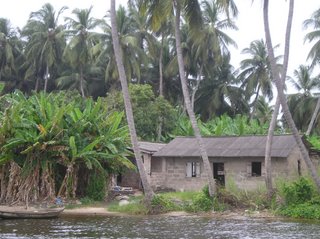
It was amazing the difference in the plant growth just this short distance away. By the beach hut there was just coconut palms and sand. Here, it was jungle. Our hosts said when they had been there before they saw monkeys in the trees, though we didn't when we were there. A snake did cross the path, and we saw lots of chickens running around the villages, but that was it as far as wildlife goes.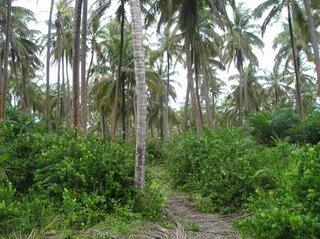 Here the peninsula was wider between the creek and the ocean beach and we hiked along a path passing several primitive villages with palm huts.
Here the peninsula was wider between the creek and the ocean beach and we hiked along a path passing several primitive villages with palm huts.
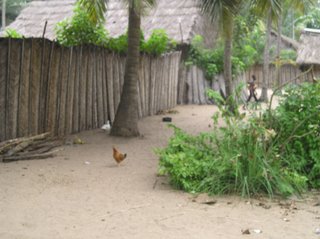
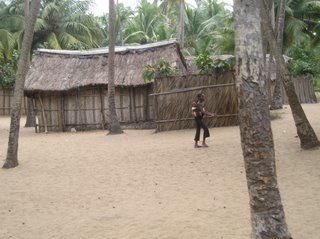 They all had piles of coconut shells beside the huts. I don't know if they were just garbage piles, or if they kept the shells for fuel.
They all had piles of coconut shells beside the huts. I don't know if they were just garbage piles, or if they kept the shells for fuel.
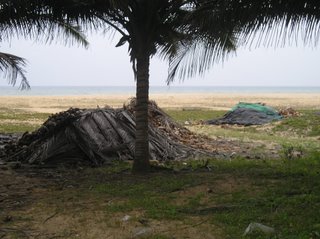
There wasn't much left of the ship. I think they said it had just ran aground in 1998, and the villagers thought the ship, with its load of furniture and goods, was a gift from the gods. They cleaned it out pretty quickly. But the hull and parts which were left there have really altered the beach and the sands of the whole peninsula as the tides were changed to go around the wreck. Now there has been a lot more sand deposited there and the village is much further from the water than it was before. I thought it was interesting how in just 7-8 years there could be such a big change in the whole land area of the peninsula.


It was amazing the difference in the plant growth just this short distance away. By the beach hut there was just coconut palms and sand. Here, it was jungle. Our hosts said when they had been there before they saw monkeys in the trees, though we didn't when we were there. A snake did cross the path, and we saw lots of chickens running around the villages, but that was it as far as wildlife goes.
 Here the peninsula was wider between the creek and the ocean beach and we hiked along a path passing several primitive villages with palm huts.
Here the peninsula was wider between the creek and the ocean beach and we hiked along a path passing several primitive villages with palm huts.
 They all had piles of coconut shells beside the huts. I don't know if they were just garbage piles, or if they kept the shells for fuel.
They all had piles of coconut shells beside the huts. I don't know if they were just garbage piles, or if they kept the shells for fuel.
There wasn't much left of the ship. I think they said it had just ran aground in 1998, and the villagers thought the ship, with its load of furniture and goods, was a gift from the gods. They cleaned it out pretty quickly. But the hull and parts which were left there have really altered the beach and the sands of the whole peninsula as the tides were changed to go around the wreck. Now there has been a lot more sand deposited there and the village is much further from the water than it was before. I thought it was interesting how in just 7-8 years there could be such a big change in the whole land area of the peninsula.

Here's a picture of Brent giving some "dash" to the women in the village for allowing us to walk through their land and take their picture. Then, several of the villagers came down to the creek to help us push off.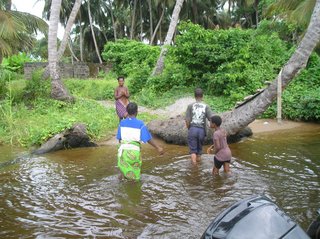
It was quite amazing to have a real African jungle adventure!
Monday, September 04, 2006
The 18th good thing about Lagos: Seeing cute kids in remote areas who have funny names for white people.
On our day at the beach, as we were walking across the peninsula from the boat dock on the creek to the beach hut on the Atlantic Ocean beach, we were greeted by a crowd of young boys. They saw us and shouted and pointed "Oyibo, oyibo!" From a book about Nigeria I had been reading, I knew what they were saying. This word is their term for white people -- literally it means "peeled one." Like our black skin had been peeled away and left us white.
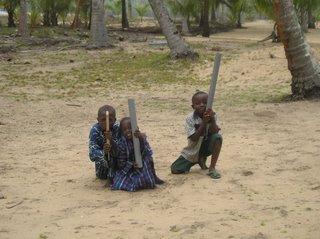

They were playing with sticks that were laying around and were very happy that our friends had brought some old soccer balls for them to play with. They enjoyed posing for pictures and loved looking at their picture on the back of the camera. They would find themselves in the picture and point and just laugh. They seemed to understand some English, but they didn't speak it well.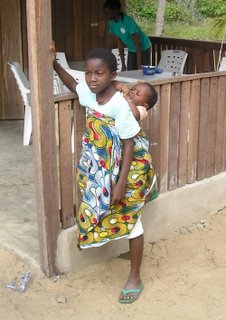
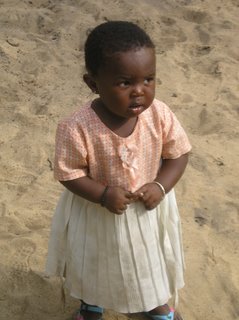 Here are some other pictures of people that were around from the village that owns the land the beach huts are built on. I guess the huts are their revenue source -- along with the "dash" that I passed on to them for taking their picture. I didn't have small bills for all the kids, so I had a little grabbing fight break out among them for the bill I offered them. Isn't this little girl cute! On the left, possibly it's her big sister carrying her, posing by the guard hut. All over the place you see babies being carried on backs with these wrapped ties. They always seem pretty happy to be there.
Here are some other pictures of people that were around from the village that owns the land the beach huts are built on. I guess the huts are their revenue source -- along with the "dash" that I passed on to them for taking their picture. I didn't have small bills for all the kids, so I had a little grabbing fight break out among them for the bill I offered them. Isn't this little girl cute! On the left, possibly it's her big sister carrying her, posing by the guard hut. All over the place you see babies being carried on backs with these wrapped ties. They always seem pretty happy to be there. 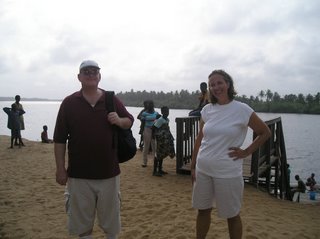 When we left, there were lots of villagers who showed up, hoping to help us load up and see us off and, probably, hoping for a little "dash" in the process.
When we left, there were lots of villagers who showed up, hoping to help us load up and see us off and, probably, hoping for a little "dash" in the process.


They were playing with sticks that were laying around and were very happy that our friends had brought some old soccer balls for them to play with. They enjoyed posing for pictures and loved looking at their picture on the back of the camera. They would find themselves in the picture and point and just laugh. They seemed to understand some English, but they didn't speak it well.

 Here are some other pictures of people that were around from the village that owns the land the beach huts are built on. I guess the huts are their revenue source -- along with the "dash" that I passed on to them for taking their picture. I didn't have small bills for all the kids, so I had a little grabbing fight break out among them for the bill I offered them. Isn't this little girl cute! On the left, possibly it's her big sister carrying her, posing by the guard hut. All over the place you see babies being carried on backs with these wrapped ties. They always seem pretty happy to be there.
Here are some other pictures of people that were around from the village that owns the land the beach huts are built on. I guess the huts are their revenue source -- along with the "dash" that I passed on to them for taking their picture. I didn't have small bills for all the kids, so I had a little grabbing fight break out among them for the bill I offered them. Isn't this little girl cute! On the left, possibly it's her big sister carrying her, posing by the guard hut. All over the place you see babies being carried on backs with these wrapped ties. They always seem pretty happy to be there.  When we left, there were lots of villagers who showed up, hoping to help us load up and see us off and, probably, hoping for a little "dash" in the process.
When we left, there were lots of villagers who showed up, hoping to help us load up and see us off and, probably, hoping for a little "dash" in the process.
Subscribe to:
Posts (Atom)
